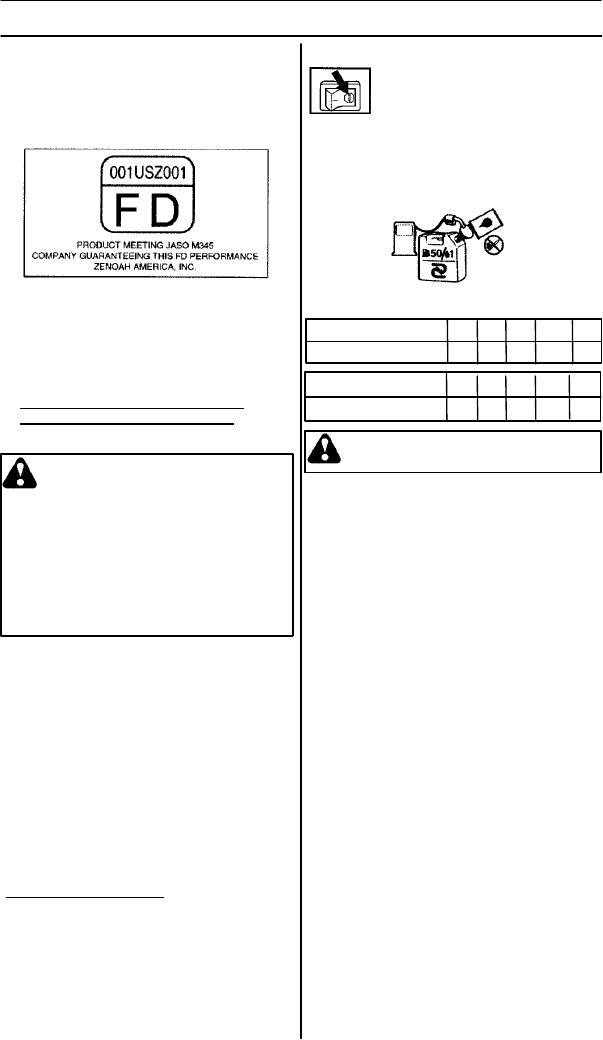
English---12
545218616 Rev. 1 12/15/08
FUEL HANDLING
How to mi
x
fuel
Recommended mixing ratio:
Gasoline50:Oil1
(when using RedMax air --cooled
“Max Life” synthetic blend premium
2-- stroke engine oil)
GASOLINE (liter) 1 2 3 4 5
2-CYCLE OIL (mL) 20 40 60 80 100
S I
f
the oil is registered with J
A
SO, the J
A
SO
Logo with FD and registration number will
be displayed on the container . The highest
JASO rating is “FD”, which equals the
ISO--L--EGD rating. Lower ratings are
“FC”, “FB”, and “FA”.
S Engine problems due to inadequate lu-
brication caused by failure to use ISO--
L--EGD certified and JASO FD registered
oil such as RedMax air--cooled “MaxLife”
synthetic blend premium 2--stroke oil
WILL VOID THE REDMAX
TWO--
STROKE ENGINE WARRANTY
.
IMPORTANT: GASOLINE/OIL MIXTURE
STORAGE RECOMMENDATIONS
Store your gasoline or gasoline/oil mix-
ture in a cool, dry area in a tightly sealed
approved container to limit the entry of
moisture and additional air (oxygen).
Moisture and air cause the development
of varnish and gum, making the fuel stale.
Stored gasoline and gasoline/oil mixture
ages and loses its octane rating and
volatility. Do not mix more gasoline/oil
than you intend to use in 30 days, and 60
days when fuel stabilizer is added. Red-
Max air--cooled “Max Life” synthetic
blend premium 2--stroke engine oil
contains fuel stabilizer
and will automati-
cally extend your gasoline/oil mixture life
up to 60 days.
W ARNING: Pay attention to
agitation.
W ARNING: Do not use NMMA
(National Marine Manufa cturers
Associatio n), BIA (Boating Industry
Association), and TCW (two-- cycle
water cooled) oils designe d for
mopeds or outboard, water cooled
marine engines. Do not use API
(American Petroleum Institute), TC
(2--cyc le) labeled oils. The API--TC
test standard has been discontinue d
by API in 1995 and it no longer exists.
GASOLINE (gal.) 1 2 3 4 5
2-CYCLE OIL (fl.oz.) 2.6 5.2 7.8 10.4 13
50:1 MIXING CHART
1. Measure out the quantities of gasoline and
oil to be mixed.
2. Put some of the gasoline into a clean, ap-
proved fuel container.
3. Pour in all of the oil and agitate well for 10
seconds.
4. Pour in the rest of gasoline and agitate again
for at least one minute. As some oils may be
difficult to agitate depending on oil ingredi-
ents, sufficient agitation is necessary. Be
careful that, if the agitation is insufficient,
there is an increased danger of early piston
seizure due to abnormally lean mixture.
5. Place a clear indication on the outside of the
container to avoid mixing up with gasoline or
other containers that don’t contain oil.
6. Indicate the contents on outside of con-
tainer for easy identification.


















